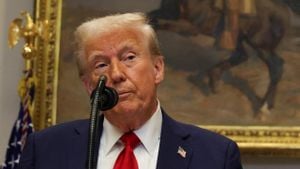Paraguay is making headlines as the long-anticipated trade deal between the European Union (EU) and the Mercosur bloc progresses, raising both hopes and cautions about its impacts. This agreement, which has been under negotiation for around 25 years, aims to create significant economic opportunities but also presents potential challenges, particularly for European farmers and producers. President Santiago Peña of Paraguay recently expressed his views on the matter during his visit to Paris, as he prepares to meet with French President Emmanuel Macron, who has shown opposition to the deal.
The trade agreement was officially signed and aims to eliminate tariffs on goods and services exchanged between the EU and Mercosur member countries, which include Argentina, Brazil, Paraguay, and Uruguay. With this pact, both sides hope to create one of the largest free-trade areas globally, comprising around 700 million consumers. Peña stated, "We can't now spend another 25 years for it to come to force," emphasizing the importance of swift ratification and implementation of the deal.
While Peña welcomes the agreement, he candidly noted during the discussion about its likely benefits: "This will bring benefits mainly for Europe and for Latin America as well." His sentiment highlights the conflicting views on the deal's advantages; some believe it primarily serves European interests due to the agricultural concessions it offers. Critics, including certain EU farmers' groups, have raised alarms about increased competition from Latin American imports, which could potentially undermine local industries.
For the EU, this deal presents both opportunities and risks. On one hand, it grants access to Latin American markets for European products like cheese, wine, and medicines. On the other hand, the prospect of increased imports of beef, poultry, and soy could challenge the EU's strong agricultural standards and endanger local farming practices. The Association of Poultry Processors and Poultry Trade (AVEC) has warned of serious impacts on the EU’s poultry sector, arguing this agreement could lead to significant imports of poultry meat, potentially comprising 9% of the EU’s consumption.
Critics of the EU-Mercosur agreement argue it primarily favors large agribusinesses at the expense of small-scale farmers and advocates for more rigorous environmental controls. They contend the pressure from cheaper imports will lead to lower standards for animal welfare and food safety across the EU. AVEC's Secretary General, Birthe Steenberg, asserted: "By favoring short-term export gains, the EU puts our strategic autonomy in agriculture on the line, undermines EU farmers and, eventually, jeopardizes its long-term sovereignty." This tension between ensuring food security and adhering to sustainable practices could become one of the agreement's most contentious issues.
On the other hand, some Latin American leaders view the deal as historic, seeing it as their opportunity to integrate more deeply with global markets. Paraguayan President Peña expressed the need for Mercosur countries to diversify their trade partnerships to maintain competitive economic advantages and reduce reliance on any single market. Peña insists, "What we need is not just to sign one deal but to continually push for integration and cooperation on all fronts."
The outlook for the ratification process is mixed. For the trade agreement to come fully to life, it must receive the green light from the respective national parliaments of the Mercosur members and obtain approval from at least 15 of the EU's 27 member states. This step is fraught with political nuances, especially considering the skepticism from various parties within member countries, including France and Poland, who have voiced concerns over the impact on their own agricultural sectors.
While optimism exists for the economic potential of the EU-Mercosur deal, the road ahead appears complex. Peña's government is eager to see the agreement ratified, viewing it as integral to enhancing Paraguay's economic stature on the world stage. Nonetheless, many stakeholders are advocating for clear safeguards to protect local industries from disruption due to the influx of imports. The merchandise flowing between the two regions could represent tens of billions of euros annually, impacting numerous sectors from agriculture to consumer goods.
The overall sentiment among economic analysts is one of cautious anticipation. To navigate this new frontier, it remains imperative for officials from both sides to engage earnestly on potential issues stemming from the pact. With deliberations continuing, the debate surrounding this trade deal is sure to generate discussion over not only trade practices but also broader norms of food safety and sustainability as the EU strives to uphold its principles simultaneously as it seeks to expand its trade horizons.
What emerges from conversations around the EU-Mercosur deal will not just define the economic contours of these regions for years to come—it may also shape the fundamental principles of trade as the world moves increasingly toward globalization and interconnectedness.



